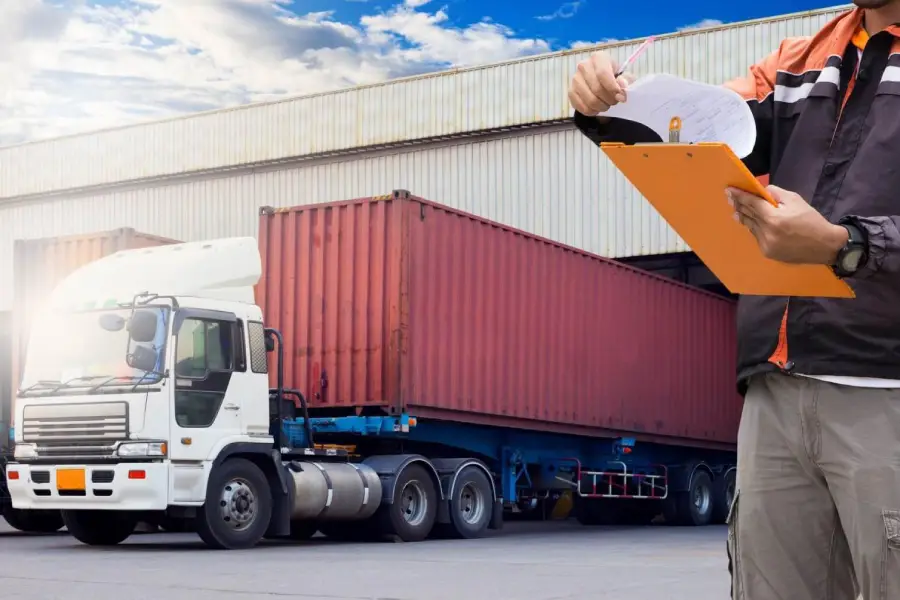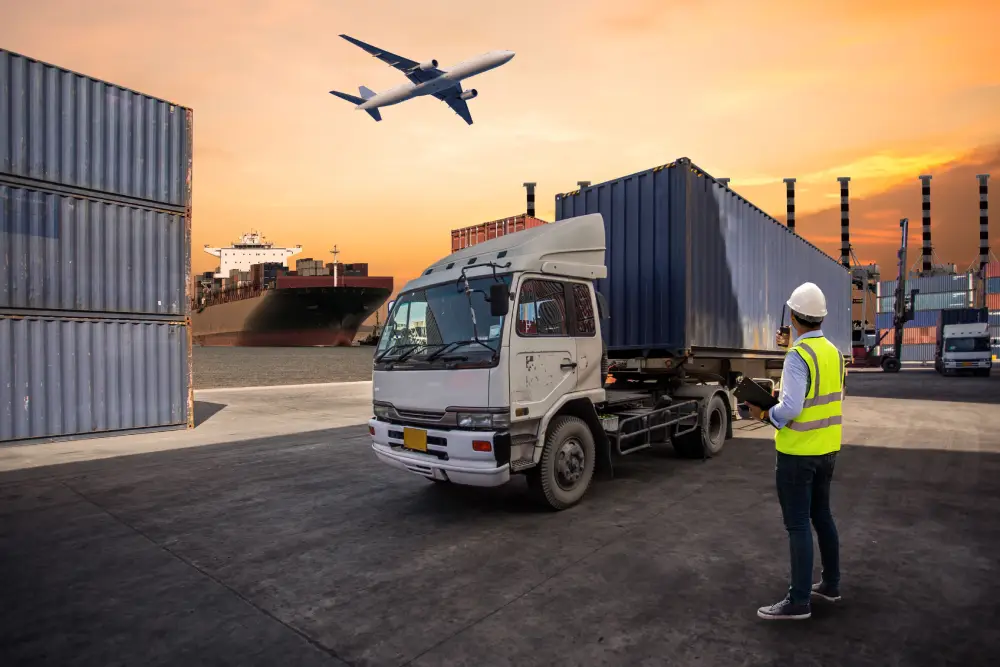In the international export and import transportation process, there is a person called a forwarder who is known as the representative or operator of this work. But what exactly are the duties of a forwarder?
The word Forward in English means to send, carry, advance and help, which in the active form, Forwarder, is understood under titles such as carrier or sender. Forwarder in transportation refers to a person and a special activity that designs and plans the process of how to transport goods from origin to final destination.
In specialized transportation texts, the person Forwarder is also called Forwarding Agent, which means exporter or transport operator. The important point about the forwarder is that this person or company is not responsible for the physical transportation of goods and only plans the process and method of moving products from zero to one hundred. But the person responsible for the physical transportation of goods is called a carrier, whose duties are different from those of a forwarder.
In the international export and import transportation process, there is a person called a forwarder who is known as the representative or operator of this work. But what exactly are the duties of a forwarder?
The word Forward in English means to send, carry, advance and help, which in the active form, Forwarder, is understood under titles such as carrier or sender. Forwarder in transportation refers to a person and a special activity that designs and plans the process of how to transport goods from origin to final destination.
In specialized transportation texts, the person Forwarder is also called Forwarding Agent, which means exporter or transport operator. The important point about the forwarder is that this person or company is not responsible for the physical transportation of goods and only plans the process and method of moving products from zero to one hundred. But the person responsible for the physical transportation of goods is called a carrier, whose duties are different from those of a forwarder.
Freight Forwarder
A freight forwarder has a specific job description that he or she must follow during the process of transporting goods and take into account all the established criteria. The Forwarder has some powers that he or she can use in moving shipments.
These individuals or companies act as intermediaries between manufacturers, importers, exporters, and shipping companies.

The duties of a forwarder include the following:
Transportation planning:
Choosing the most appropriate transportation method (air, sea, or land) based on the customer’s needs and the type of goods.
Determining the best route to reduce transportation costs and time.
Document Management:
Preparation and processing of all necessary documents for export and import, including invoices, bills of lading, packing lists and standard certificates.
Customs formalities:
Assist in carrying out all customs procedures, including preparing the necessary documentation, paying duties and taxes, and communicating with customs authorities.
Coordination with transportation companies:
Establishing relationships with companies providing transportation, warehousing and distribution services and monitoring the proper performance of services.
Cargo insurance:
Offering insurance to cover potential risks during transportation and ensuring the security of goods.
Access to transportation networks:
Using extensive networks that facilitate connection to transportation companies, customs and other relevant departments.
Advantages of using forwarding services:
- Time and cost savings
- Expertise in local laws
- Risk management
Forwarders in the international trade industry
Forwarders play a vital role in international trade and help businesses import and export their goods to global markets. Given the complexities of the international transportation process and changes in laws and regulations, having an experienced forwarder can be a facilitator and key to success in this area.
Now that we have learned about the importance of forwarders and gained a better understanding of this word, in the rest of this article we are going to introduce the types of forwarders:
Sea forwarding
This type of forwarding is related to the transportation of goods by sea. It is usually suitable for bulky and heavy goods and includes services such as loading, unloading and processing customs documents.
Air Forwarding
This type refers to the transportation of goods using airplanes. Air forwarding is used for goods that require rapid delivery, such as medical supplies and perishable products.
Land Forwarding
In this type, goods are transported by land (using trucks, trains, etc.). Land forwarding is usually suitable for domestic transportation or between neighboring countries.
Intermodal Forwarding
This type of forwarding is a combination of two or more transportation methods (such as sea and land or air and land). This method helps in high efficiency and cost optimization.
Export and Import Forwarding
Export Forwarding: This type is dedicated to helping exporters in the process of transporting their goods to foreign destinations.
Import Forwarding:
In this type, the forwarder helps importers to receive and clear imported goods correctly.
Forwarding, Freight Forwarder
This type refers to brokers who specialize in providing forwarding services and can provide tailored services according to the type of goods and customer needs.
Specialized forwarding
This type includes forwarding of special goods, such as dangerous goods (such as chemicals) or sensitive goods (such as medical equipment) that require compliance with specific regulations and special conditions.
This variety in forwarding services helps traders and importers to choose the best method of transportation according to their specific needs.
In the general transportation sector, as mentioned, in the matter of export and import, they seek help from individuals or companies called forwarders, but these individuals or companies need to cooperate with other organizations such as:
Regulatory and Policy-Making Organizations
Maritime Transport
The government organization that oversees maritime transport in Iran is the Shipping Ports Organization, which is one of the deputy ministries of the Ministry of Roads and Transport. The main duties of this organization are to manage the country’s ports, supervise domestic and foreign shipping companies, manage coastal waters, compile the necessary regulations and rules for domestic and foreign maritime transport, certify sailors and ship crews, review international conventions in maritime transport, and other matters.
At the international level, the body that oversees maritime transport is the International Maritime Organization, which is one of the United Nations’ affiliated organizations and is responsible for regulating and compiling international maritime transport regulations at the international level.
Air Transport
The government organization that oversees Iranian air transport is the Civil Aviation Organization, which is one of the deputy ministries of the Ministry of Roads and Transport. Its main duties include managing the country’s airports and similar duties to the Ports Organization in air transport.
At the international level, it is the supervisory body for air transport and the International Civil Aviation Organization, which is a subsidiary organization of the United Nations and is responsible for regulating and compiling international air transport regulations at the international level.
Road Transport
The government organization supervising road transport in Iran is the National Transport and Terminals Organization, which is subordinate to the Ministry of Roads and Transportation. The main duties of this organization are to manage road transport and companies active in this matter in the country and to compile relevant regulations and bylaws.
The supervisory organization at the international level is the International Road Transport Union, which is a subsidiary organization of the United Nations and has similar duties to international organizations in road transport.
Rail Transport
In the case of rail transport, there is currently no separation between the supervisory organization and the railway transport organization in the country, and the Iranian Railways Organization is responsible for both duties.
At the international level, there is no single organization for rail transport, but rather, matters are handled by various organizations such as the following:
The International Organization of Railways, which develops railway standards and communicates them to railways.
The organization overseeing the implementation of the Convention in Western Europe and the Middle East is OTIF.
The organization overseeing the implementation of the SMGS Convention in Eastern Europe and the CIS countries is OSJD.
Specialized service institutions
These are companies that provide specialized services in transportation in a specific area. The most important of these types of institutions are:
Inspection companies
The main activity of inspection companies is to carry out the technical condition and classification of means of transport and sometimes they subject the goods to quantitative and qualitative inspection at the origin on behalf of the buyer and confirm their compliance with the documents (purchase contract, letter of credit, proforma, etc.). The certificates issued by such institutions are considered the most important commercial documents and the activities of such companies are controlled by the competent authorities so that, firstly, they have the necessary expertise and knowledge and secondly, they have the necessary credibility to guarantee the certificates issued.
Transport brokerage companies
Such institutions, such as shipping agencies, airline agencies and customs brokers, act on behalf of carriers or merchants and shippers, as the case may be, and their activity is mainly to provide specific local services.
Stevedoring Companies
These institutions, often known as Stevedoring Companies, provide services for loading and unloading goods and sometimes other services such as warehousing, counting, refrigeration, dunnage, packaging and other related activities. The main activity of these companies is in ports and points of entry and exit of goods.
Public service institutions
This group is made up of institutions that operate independently and part of their activities are related to transportation needs. Among them, we can mention the activities of banks in relation to letters of credit and the main factor in commercial payments, as well as insurance companies in relation to transportation insurance, and finally the activities of law firms and arbitration boards and tribunals.

